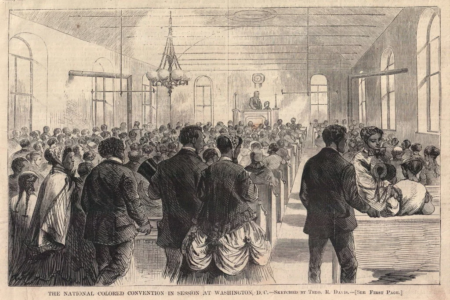
The Two Faces of American Freedom, Ten Years Later: Part Two
In celebration of the tenth anniversary of its publication, Henry Brooks interviews Aziz Rana on his influential book and what it might teach us about the legacies of populism.

In celebration of the tenth anniversary of its publication, Henry Brooks interviews Aziz Rana on his influential book and what it might teach us about the legacies of populism.

In celebration of the tenth anniversary of its publication, Henry Brooks interviews Aziz Rana on his influential book and what it might teach us about the legacies of populism.

Scholarship thus far has not reconciled the relationship between democratized agency policymaking and the regular lawmaking done by Congress. To ameliorate the inexorable agency costs, theorists generally pose two different solutions: (1) a democratization of agency discretion, e.g., by making notice and comment procedures more robust; or (2) forcing Congress to elaborate their intent in fine-grained detail or undertake more robust oversight. Both moves inadvertently replicate a conceptual mistake committed by many anti-administrativists. This essay will rectify this mistake.

The argument that gender stereotypes structured law, and therefore shaped social identities and practices, is relatively familiar to historians and legal scholars. Less widely discussed is how gender ideologies influenced the development in the United States of what sociologist Gøsta Esping-Andersen termed a liberal welfare state. How did Ruth Bader Ginsburg’s vision of feminism fit in with other movements at the time?

The key to understanding the connection between rights and material conditions is a conception of democracy…. people who are suffering from certain basic forms of deprivation and disadvantage will find it impossible to exercise fundamental rights and they will be unable to participate meaningfully in the project of cooperative government. Liberties may become impossible to realize without sufficient primary goods, while membership status within the political community may be degraded by structural inequality of economic wherewithal. Such problems can be avoided, at least partially, if freedom of speech and religion are construed in ways that are sensitive to the material conditions for their meaningful exercise. Otherwise, the conditions for the cooperative project of self-government will be absent.

This post is part of our symposium on socialist constitutionalism. The Federalist Society leverages right-wing legal change by promoting constitutional originalism as a seemingly noble and neutral foundation for neoliberal political economy. Without a comparably accessible and compelling contrary first principle, left and centrist law and politics can appear to be a diffuse agenda of contested…

Black Americans have endured police violence since the nation’s founding. The origins of American policing have been traced to slave patrols. Today, Blacks are more likely than whites to encounter police, to be stopped by police, and to be fatally wounded by police. In recognition of this history and ongoing experience of violence, the Movement for Black Lives (“M4BL”) has called for the defunding of the police; community control of policing; and the development of nonpunitive, noncarceral institutions for resolving social conflict, among other transformative changes.

This post was originally published at Jacobin. Last Monday, the Supreme Court ruled that employment discrimination on the basis of sexual orientation or gender identity is prohibited by Title VII of the Civil Rights Act of 1964. The decision brings employment law in line with public opinion: a majority of Americans favor employment protections for LGBT…

Constitutionalism sits at the commanding heights of law. That framework of governing structures, rights, and ideals shouldn’t be abandoned to right-wing and liberal-centrist construction. Socialists and progressives instead ought to embrace a constitutional vision in which legislative and executive power give effect to the spirit of democratic equality that underlies but outruns the Constitution’s text.

Centering the constitutive power of law destabilizes the usual public/private distinction and enables a vision of socialism that incorporates transformative reforms to “private” entities—and that has room for localism and decentralization, where appropriate.

In Forbath’s telling, Weimar is not a cautionary tale but an opportunity for a do over. There’s much to like, and learn, from rekindling this vision of social democracy. In what follows, I invite other characters to this story, drawing from Mexico’s constitutional history, and raise a few questions about the limits of the social democratic bequest as a compass for our imagination.

Willy Forbath’s return to the Weimar Constitution is inspiring. I will just point out of a couple of limits to turning back to it in the present — limits that strike me as difficult to overcome.

In my last post, I began a discussion of the Weimar Constitution as one of the first constitutions containing provisions for social and economic rights (SER), and perhaps the very first one, in which socialists had an important hand drafting and expounding. The literature on constitutional SER misses a great deal when it casts the Weimar Constitution as a weak, infant version of later SER constitutions, which grew stronger over time.

Socialism is back. But what is socialism? We have forgotten a lot about what it meant in its salad days, a century ago. And what we have forgotten may include what might be compelling today.

Adrian Vermeule recently made a stir with his proposal for a “common-good constitutionalism.” He argued that originalism had “outlived its utility” now that the right had gained power on the federal bench. Instead it was time for a “substantively conservative approach to constitutional law and interpretation.” We got only a few peaks at the substance,…